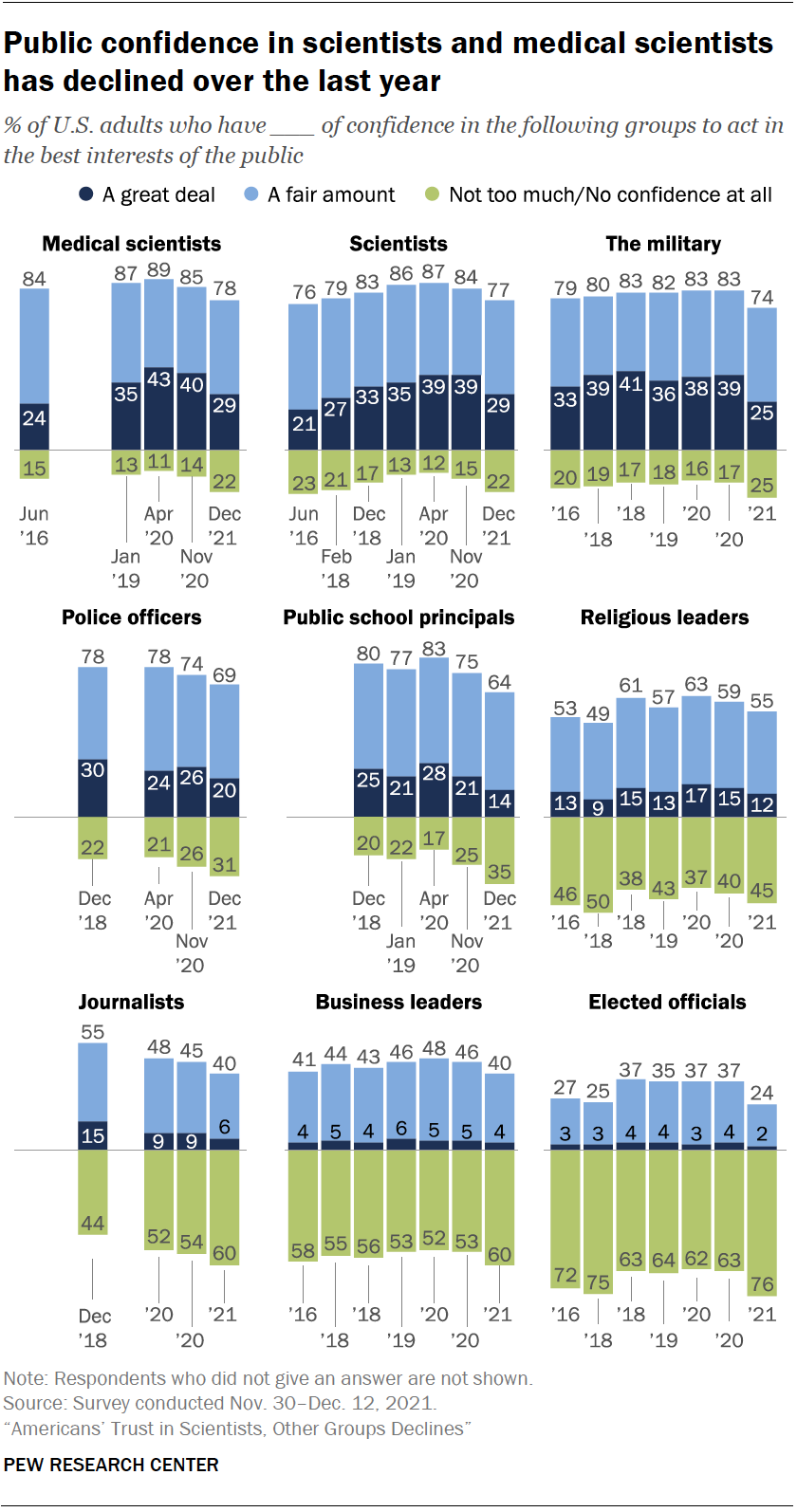The OneAmerica insurance company noted there has been a huge rise in deaths not caused by COVID-19 and experts said that is due to people not going to see their doctors because media hammered everyone with the perception that hospitals were so overcrowded that patients were on gurneys being triaged in the parking lot. Among those who did not die due to fearing COVID-19 more than cancer, suicides and violence are up dramatically.
While none of that is good, but at least there is some 'at least it didn't get worse' news. Germany has edged up a little in science acceptance during the pandemic. It's an improvement over the anti-agriculture, anti-nuclear, anti-vaccine trifecta that dominated their culture until 2021.(2) The survey results showed trust in science rose after the pandemic began and though that had declined by November 2020, it was still higher than in 2019.(3)
In the US the situation is different. A new Pew survey finds only 29 percent of U.S. adults continue to have a great deal of confidence in medical scientists, down from 40 percent in late 2020. In years past, distrust would've been more heavily Democrats but now 44 percent have a great deal of confidence versus 15 percent of Republicans, a flip from the 31 percent when the pandemic began.

It is fair to note that big trees fall harder. America leads the world in science output and adult science literacy and that means any change is more pronounced. And obviously the extremes are never going to be the whole story, 78 percent overall have at least a fair amount of confidence in medical scientists, and given how political the public discovered epidemiology has long been that it isn't lower is a testament to American common sense.
Who really has lower trust, from the lows they were already at before the pandemic? Corporate journalists and politicians. The number of Americans have little to no confidence in them is now at 60 percent.
NOTES:
(1) Democrats in rural Pennsylvania, once a famously pro-union, blue collar state, now have the same worry. They don't want to tell anyone they're Democrats any more than Republicans in California do. They feel disenfranchised because they believe the party is only focused on large urban centers. They know that is why Democrats want to get rid of the electoral college; in a population vote, they'd only need to campaign in 5 states.
Lt. Gov. John Fetterman is an exception. He's running for Senate and has been on a road trip to engage voters who have never seen a Democratic candidate for a statewide election in person. Democrats usually only campaign in Philly and Pittsburgh, which may be why Donald Trump won the state in 2016.
(2) Their acceptance of science is still political even though it changed sides. Whereas the left dominated anti-science beliefs recently, including refusal of vaccines, the differences were slight enough that it didn't look alarming. When much of a culture vaguely distrusts science no group takes the primary blame but the pandemic caused more polarization. For example, supporters of the anti-immigration, anti-EU Alternative for Germany party showed weaker increases in trust at the start of the pandemic and stronger decreases in trust later. Far-left parties also have significant levels of distrust; but like in the US they claim to distrust corporations rather than government.
Germany is fast-tracking a pipeline from Russia to get more natural gas while claiming to care more about climate change and adopting the solar power that will have people freezing in the winter. They claim that the emissions are not "theirs." That is obviously politics.
(3) There are well-known limitations to surveys. I used to chuckle when I would note that the anti-vaccine movement existed almost exclusively on the left in the US and a Democrat in academia would try to refute actual vaccine refusal from the CDC with survey results - as if anyone on surveys says they hate science and medicine. They never said they were opposed to vaccines, they invoked the Precautionary Principle and Needs More Testing.
What people hate is politicization of science and medicine. When California had more unvaccinated children than the rest of the US combined, wealthy elites on the coast didn't say they hated science, they said they distrusted government, who were in bed with Big Pharma lobbyists. They said "natural" immunity worked better than vaccines. They said it was their choice and government shouldn't tell kids they can't go to school without a vaccine.
It is the same argument today about COVID-19 vaccines but corporate journalists and academics are far more likely to call those out, likely because they are not being made by their political tribe. This time.




Comments